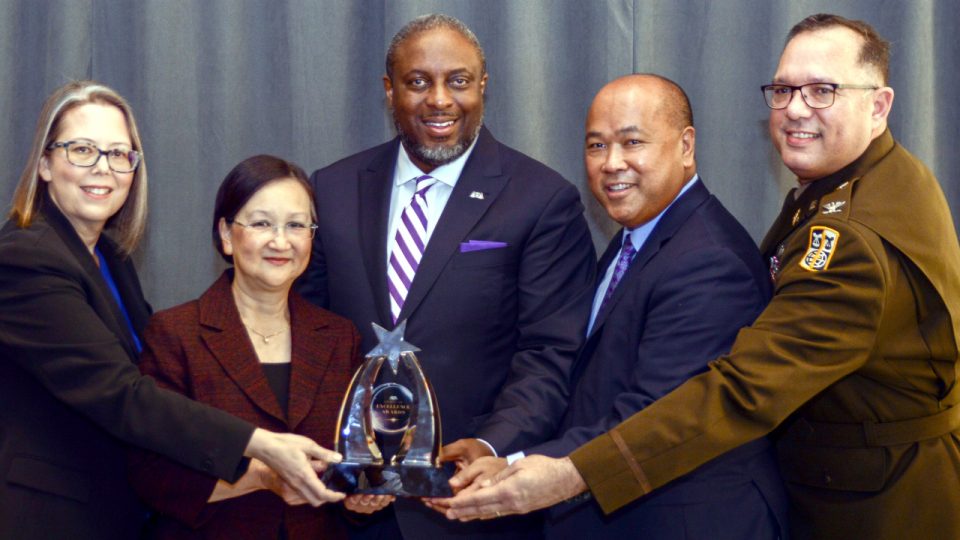
RENO, Nev. (Feb. 7, 2024) — National Judicial College President & CEO Benes Z. Aldana received the American Bar Association’s Spirit of Excellence Award on February 3 during the ABA’s midyear meeting in Louisville, Kentucky.
According to the ABA, the Spirit of Excellence Awards celebrate the efforts and accomplishments of lawyers who work to promote a more racially and ethnically diverse legal profession. Awards are presented to lawyers who excel in their professional settings; who personify excellence on the national and international level; and who have demonstrated a commitment to racial and ethnic diversity in the legal profession.
In his acceptance speech, President Aldana thanked his family and many others, especially fellow lawyers he met through the ABA, for helping him along his life and career paths. He also used the occasion to urge action to protect the justice system from threats.
“Receiving this award today is not just an honor; it’s a call to action,” he said. “In these challenging times, when the rule of law and the ideals of justice are under threat, this recognition strengthens my resolve to stand up and speak out. We must defend the principles of equality and justice and inspire our leaders to uphold the ideals that founded this nation.”
During his nearly seven years leading The National Judicial College, which is the nation’s oldest, largest and most widely attended school for judges, President Aldana has established a national reputation as a pioneer and force multiplier in the field of judicial education.
During his tenure, the NJC has launched a first-of-its kind Judicial Academy for lawyers who aspire to become judges as well as new courses on artificial intelligence, climate science, and other emerging topics. An annual Judicial Renaissance course, presented abroad, brings together judges from around the globe for wide-ranging study of the origins of law and justice.
In 2020, the college achieved record-shattering enrollment after launching special online programming in response to (1) the coronavirus pandemic; and (2) increased concerns about racial injustices in the wake of the police killing of George Floyd.
In 2018, the College organized a national symposium in Washington, D.C., examining efforts to undermine the public’s faith in the courts and the news media. Two subsequent national symposia, in Chicago in 2022 and an event scheduled for Boston in March 2024, focus on threats to an impartial and independent judiciary and strategies to preserve this fundamental element of a democracy.
Prior to joining the college, President Aldana had a distinguished 22-year career in the U.S. Coast Guard that included serving as the first Asian Pacific (Filipino) American chief trial judge in U.S. military history. He retired with the rank of captain.
He currently serves on the Military Justice Review Panel, a group established by the Secretary of Defense to conduct independent periodic reviews and assessments of the operation of the Uniform Code of Military Justice.
In the aftermath of 9/11, President Aldana was deployed as a legal adviser to the Department of Defense Criminal Investigation Task Force in Guantanamo Bay, Cuba. The Task Force conducted criminal investigations of suspected terrorists detained by U.S. forces.
He has held many leadership positions within the American Bar Association and currently serves as the Chair of the ABA’s Commission on Sexual Orientation and Gender Identity.
President Aldana was one of five Spirit of Excellence honorees for 2024 along with U.S. District Judge Sara Hill of the Northern District of Oklahoma, U.S. District Judge Dolly Gee of the Central District of California, Judge Advocate General’s Corps attorney Col. Jose A. Cora, and attorney Juan R. Thomas, of counsel at Quintairos Prieto Wood & Boyer P.A.
# # #
Founded in 1963 at the recommendation of a committee headed by Supreme Court Justice Tom C. Clark, The National Judicial College remains the only educational institution in the United States that teaches courtroom skills to judges of all types from all over the country, Indian Country and abroad. The categories of judges served by this nonprofit, nonpartisan institution, based at the University of Nevada, Reno, decide more than 95 percent of cases in the United States. Every year the school educates judges from all 50 states either in person or online.

CHICAGO – The American Bar Association Judicial Division announced recently that TheNational Ju...

The National Judicial College is mourning the loss of former faculty member Judge Duane Harves, who passed ...

As the world manages an evolving natural environment, The National Judicial College announced today that it...

Do’s Manage your cases systematically Devise a system that works for you and your organizational...

After 22 years of teaching judges, Tennessee Senior Judge Don Ash will retire as a regular faculty member a...